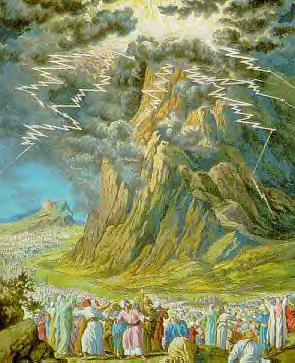The penalty for looking at God is death,
so sayeth the Lord to Moses: "And he said, Thou
canst not see my face: for there shall no man see me, and live." (Exodus
33:20) However, Moses and seventy of the
elders of Israel evidently met with God, saw him, and lived to tell
about it. Here is the story:
"And he said unto Moses, Come up
unto the Lord, thou, and Aaron, Nadab, and Abihu, and seventy of the
elders of Israel and worship ye afar off.....Then went up Moses, and
Aaron, Anadab, and Abihu, and seventy of the elders of Israel. And
they saw the God of Israel: and there was under his feet as it
were a paved work of a sapphire stone....and upon the nobles of the
children of Israel he laid not his hand."
(Exodus
24:1-11)
It seems quite clear that Moses and the others SAW God and God
forgave them; otherwise why would the author of Exodus tell us that God
did not lay his hand on the men? It seems as if the author is telling us
that the Lord did not act as he normally might in such a situation: God
did not strike the men dead, "he laid not his hand"
on the men. This appears to demonstrate almost conclusively that the men
saw God--just as they said they did, but God chose to forego the
usual death penalty meted out to anyone who dared to look at him [1].
Thus, the authors of the books of Exodus and John were wrong; man had
seen God and lived.
[1] The author is grateful to Herb Slocum for calling attention
to this passage and recognizing the implications of the words "he
laid not his hand".
|
